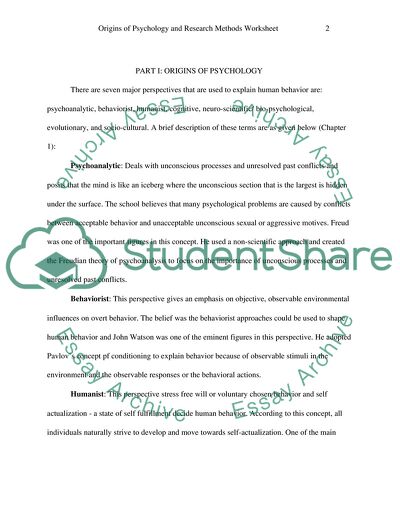
- Home
- Free Samples
- Premium Essays
- Editing Services
- Extra Tools
- Essay Writing Help
- About Us
- Studentshare
- Subjects
- Miscellaneous
- Origins of Psychology and Research Methods Worksheet
Origins of Psychology and Research Methods Worksheet - Essay Example

- Subject: Miscellaneous
- Type: Essay
- Level: Masters
- Pages: 4 (1000 words)
- Downloads: 0
- Author: stoltenbergbail
Extract of sample "Origins of Psychology and Research Methods Worksheet"
Freud was one of the important figures in this concept. He used a non-scientific approach and created the Freudian theory of psychoanalysis to focus on the importance of unconscious processes and unresolved past conflicts. Behaviorist: This perspective gives an emphasis on objective, observable environmental influences on overt behavior. The belief was the behaviorist approaches could be used to shape human behavior and John Watson was one of the eminent figures in this perspective. He adopted Pavlov’s concept pf conditioning to explain behavior because of observable stimuli in the environment and the observable responses or the behavioral actions.
Humanist: This perspective stress free will or voluntary chosen behavior and self actualization - a state of self fulfillment decide human behavior. According to this concept, all individuals naturally strive to develop and move towards self-actualization. One of the main developers of this concept was Abraham Maslow who developed the needs hierarchy theory. According to this theory, five hierarchal needs help a human being to grow. Cognitive: This perspective emphasizes thoughts, perception and information processing.
It studies gathers, encodes and stores information using a vast array of mental processes such as perception, memory, imagery, concept formation, problem solving, reasoning, decision making and language. One of the foremost practitioners was Jean Piaget who framed many theories regarding human behavior and these have been used in various industrial and social settings. Neuro-scientific/ bio-psychological: This perspective examines behavior through the lens of genetics and biological processes in the brain and other parts of the nervous system.
The concept explores the role of biological factors in all areas of psychology and considers biological, psychological and social processes. One of the main experts was Johannes Miller
...Download file to see next pages Read MoreCHECK THESE SAMPLES OF Origins of Psychology and Research Methods Worksheet
Leadership in Non Profit Organizations
Main Leadership Insights
A Comparison of Some Methods of Cluster Analysis with SPSS
Empirical research
Does Homework Improve Academic Achievement
The Origin of Intelligence in Children
Correcting the Spelling Errors
Use of Gilberts Model in Technology Integration in High Schools

- TERMS & CONDITIONS
- PRIVACY POLICY
- COOKIES POLICY